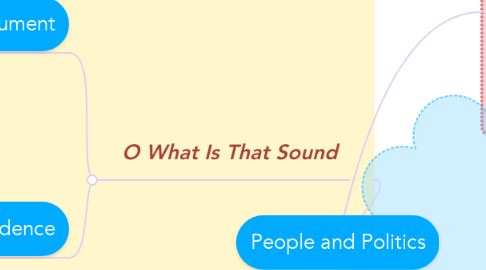
1. O What Is That Sound
1.1. Argument
1.1.1. Written in the interbellum period, the poem invokes an atmosphere of impending war
1.1.2. Consideration of Auden's context provides insight into the purpose of the text, calling to mind the persecution of minorities by the Nazis
1.1.3. Auden represents the vulnerability of individuals in society to political actions driven by control, suggesting the Nazis should serve as an example "or perhaps a warning."
1.2. Evidence
1.2.1. Beginning each sentence with archaic "O" suggests ambiguity as to intentions of "scarlet soldiers". Allegorical allusions class in doctor, parson farmer
1.2.2. Call and response structure: two conflicting narrative voices contrasts emotions also implies naivety in the face
1.2.3. Impending danger exemplified by repetition throughout the poem: "drumming... wheeling... deceiving."
1.2.4. Shortness of the fourth line in each stanza adds to the tumbling effect of the poem
1.2.5. Textual features combine to create sense of urgency and desperation, especially as steady 'marching' rhythm picks up pace, suggesting naivety/ambivalence adds fuel
2. Epitaph on a Tyrant
2.1. Evidence
2.1.1. Qualifier "Of a kind" directly following "perfection" inclines us to cast doubt on the purity of a tyrant's motives, highlighting ambiguity that conceals the true desires of a tyrant, control.
2.1.2. "The poetry he invented was easy to understand" references propogandistic rhetoric employed by individuals: act of representation that feeds manipulates and feeds off the needs of the audience by playing "human folly" - social insecurities,trepidation
2.1.3. Dramatic shift in tone of the final line parallels both previous texts in its suggestion that once political motivations of oppressive individuals or groups have been revealed, it is often too late, as their ultimate goal of control has been achieved
2.1.4. “When he laughed, respectable senators burst with laughter” allusion to classical roman politics implies populist devotion and a ‘cult of the personality’ often established by the political ignorance of supporters.
3. Conceptual Framework
3.1. Through subjectivity, composers use textual form and associated techniques to influence the reception of meaning in order to deter the endorsement of individuals/groups motivated by power
3.2. An evaluation of WH Auden's poems as well as Plutarch's autobiography provides insight into the competing political perspectives that influence composers' representation of individuals' motivations
3.3. Political ignorance, ambivalence and naivety fuels the ascension of individuals and groups motivated by power, often to the point where it is too late once motivations are revealed.
3.4. The power to influence people's behaviours and the course of events is necessary to enact change in society, whether it be for the better or worse. Hence, control is the necessary and ultimate goal of politics.
4. Life of Caesar
4.1. Argument
4.1.1. Explores the impact of an individual's political motivations on society, specifically with regard to the fall of the Roman Republic as being a direct result of the pursuit of power
4.1.2. ethical biography and not history; he was a moralist who shaped meaning through a series of 'Parallel Lives' in order to provide his audience with a representation of how character motivations positively or negatively shaped the destiny of the state.
4.1.3. Control was the ultimate goal of Roman politics, however, this was traditionally motivated by 'dignitas' and 'gloria' as part of the 'Path of Honour.'
4.2. Evidence
4.2.1. "'I had rather be the chiefest man herethan the second person in Rome."
4.2.2. "'I have just cause to weep... at my age he had conquered the world."
4.2.3. "He so pleased the people that they devised daily to give him new offices,"
4.2.4. "It would one day turn to the destruction of the whole state and the commonwealth of Rome - too late they found."
4.2.5. "What made Caesar most openly and mortally hated was his passion to be made King..."
4.2.6. "soldier and general not in the least inferior to any of the greatest and most admired commanders."
4.2.7. "Cicero was the first who saw the designing temper of the man beneath his kindly and cheerful exterior."
4.2.8. "He had the greatest natural talent for political oratory.."
4.2.9. "Senate pronounced that they should give him such honours as were meet for amen: others added too honours beyond all reason"
